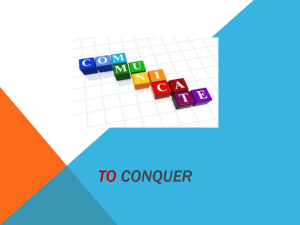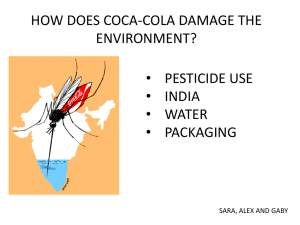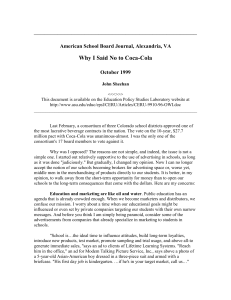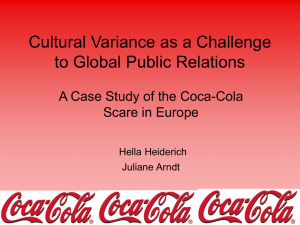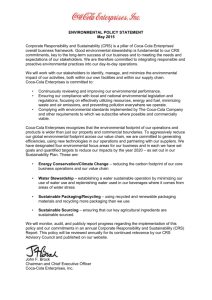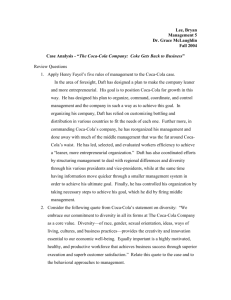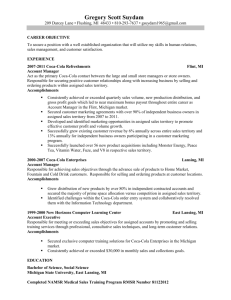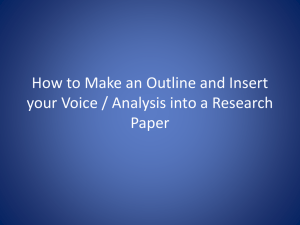Singing Coke's Praises Evolves
advertisement
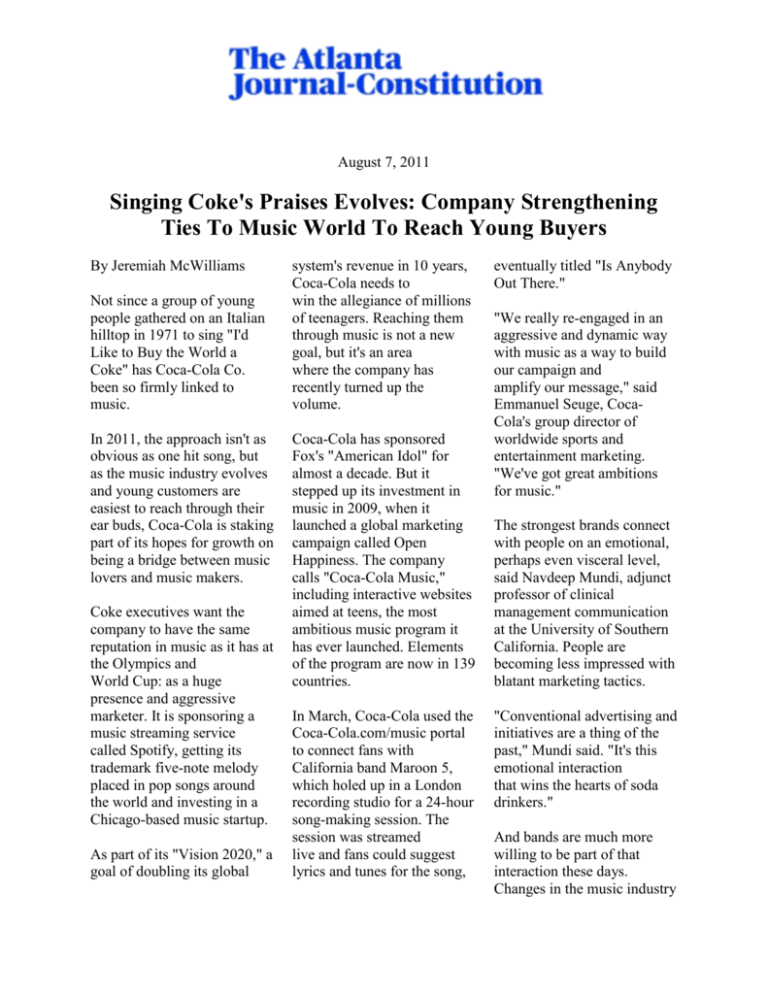
August 7, 2011 Singing Coke's Praises Evolves: Company Strengthening Ties To Music World To Reach Young Buyers By Jeremiah McWilliams Not since a group of young people gathered on an Italian hilltop in 1971 to sing "I'd Like to Buy the World a Coke" has Coca-Cola Co. been so firmly linked to music. In 2011, the approach isn't as obvious as one hit song, but as the music industry evolves and young customers are easiest to reach through their ear buds, Coca-Cola is staking part of its hopes for growth on being a bridge between music lovers and music makers. Coke executives want the company to have the same reputation in music as it has at the Olympics and World Cup: as a huge presence and aggressive marketer. It is sponsoring a music streaming service called Spotify, getting its trademark five-note melody placed in pop songs around the world and investing in a Chicago-based music startup. As part of its "Vision 2020," a goal of doubling its global system's revenue in 10 years, Coca-Cola needs to win the allegiance of millions of teenagers. Reaching them through music is not a new goal, but it's an area where the company has recently turned up the volume. Coca-Cola has sponsored Fox's "American Idol" for almost a decade. But it stepped up its investment in music in 2009, when it launched a global marketing campaign called Open Happiness. The company calls "Coca-Cola Music," including interactive websites aimed at teens, the most ambitious music program it has ever launched. Elements of the program are now in 139 countries. In March, Coca-Cola used the Coca-Cola.com/music portal to connect fans with California band Maroon 5, which holed up in a London recording studio for a 24-hour song-making session. The session was streamed live and fans could suggest lyrics and tunes for the song, eventually titled "Is Anybody Out There." "We really re-engaged in an aggressive and dynamic way with music as a way to build our campaign and amplify our message," said Emmanuel Seuge, CocaCola's group director of worldwide sports and entertainment marketing. "We've got great ambitions for music." The strongest brands connect with people on an emotional, perhaps even visceral level, said Navdeep Mundi, adjunct professor of clinical management communication at the University of Southern California. People are becoming less impressed with blatant marketing tactics. "Conventional advertising and initiatives are a thing of the past," Mundi said. "It's this emotional interaction that wins the hearts of soda drinkers." And bands are much more willing to be part of that interaction these days. Changes in the music industry --- from the switch to digital music to less marketing dollars at big music companies --- have altered perceptions of such deals. Many bands that might once have worried about being accused of selling out are more than happy to play along with big brands. Kodak signed Kings of Leon, Bayer's Yaz brand got the Veronicas, and body spray Axe teamed with Atlanta rapper Ludacris. State Farm sponsored a music video by Los Angeles quartet OK Go. "We can get deals done that we never would have gotten done before," said Marcus Peterzell, executive vice president of entertainment at Ketchum, a New York-based public relations and marketing firm. "Ten years ago, if I approached artists with the deals I'm doing now, they'd say, 'Absolutely not.' Now, everything is on the table." Lori Landew, co-chair of the entertainment and sports law practice at Philadelphia law firm Fox Rothschild, said artists have realized that brands --- including CocaCola, with its displays, trucks and ubiquitous commercials -- can help them reach high levels of exposure. PepsiCo once had a reputation as the beverage company that ventured most aggressively into music. Its "Pepsi Generation" branding and partnerships with Michael Jackson, Madonna and Britney Spears are still referenced as examples of big bets that paid off. It has also teamed with Britney Spears and Justin Timberlake. Music was the company's "center of gravity" in the 1980s and 1990s, said Frank Cooper, chief marketing officer for global consumer engagement at PepsiCo Global Beverages Group. After its musical heyday, PepsiCo didn't disappear from the music scene. It gave away 100 million iTunes downloads in 2003, for example. But it noticeably reduced its investment in music in recent years. PepsiCo now wants to return music to its high-profile position, Cooper said. PepsiCo announced Friday that it plans to give the winner of former "American Idol" judge Simon Cowell's "X Factor" a chance to star in a PepsiCo Super Bowl commercial. The singing competition, which will air this fall on Fox, is one of PepsiCo's largest marketing investments this year. "I think what we've learned over the last couple of years is that music continues to be our center of gravity," Cooper said. "You'll see that going forward." Coca-Cola's music efforts rely strongly on reaching customers, especially young people, in the online world. Last month, Coca-Cola and Sprite helped music service Spotify expand into the United States from Europe. The brands gave out more than 100,000 access codes through their websites so fans could jump a waiting list that grew into the hundreds of thousands. Spotify's music library has more than 15 million tracks. It allows users to search and play songs on personal computers, Macs, home audio systems and cellphones. The service doesn't require large downloads of files, and users can connect Spotify to Facebook and share their music with friends. With teenagers permanently connected to their phones for gaming, social media and music, Coca-Cola has to follow them. "The way it works is the way teens are interacting with music today," said Stuart Kronauge, vice president of trademark Coca-Cola brands at Coca-Cola North America. "Everything a teen does goes through a little mobile screen. We're very clear that we want to be where teens are." Of course, a hit song is always welcome, too. Coke's fingerprints were on a Christmas song ("Shake It Up" by pop band Train) and a World Cup anthem called "Wavin' Flag" by Somalianborn rapper K'NAAN that hit No. 1 on the radio charts in 18 nations. Both songs contained the five notes that serve as Coca-Cola's musical signature in commercials around the world. "Music can have a tremendous influence on what people purchase, and how much," said George Haley, director of the Center for International Industry Competitiveness at the University of New Haven. In late July, Coca-Cola announced a small investment in Chicago-based music licensing company Music Dealers, which has links to more than 10,000 artists and says it has one of the largest catalogs of precleared music for quick licensing. Coca-Cola plans to use the 40-employee company to find music it can use in commercials and other online material. Coca-Cola doesn't plan on making money directly from the deal. "We're not a music company," Seuge said. "We're very enthusiastic about what we're learning." instrumentalists for two weeks of recording sessions, lectures and late-night jams every year. Chevrolet created its own channel on Pandora, featuring the 100 best songs mentioning Chevy. How we got the story Some ways it works Last year, when Coca-Cola needed a song that would appeal to teens as the global soundtrack for its "Coca-Cola Music" program, Music Dealers compiled 22 songs within 24 hours. The song that was eventually chosen has aired in a commercial in 60 countries. Music Dealers also created a short list of emerging artists who could help British pop singer Taio Cruz to create a new mix of his song "Higher." Cruz selected three indie artists for the program, and Coca-Cola's fans used Facebook "likes" through the Coca-Cola Music digital hub to choose the eventual winner. What other companies are doing Starbucks started a music label for independent artists. Red Bull's Music Academy brings together producers, vocalists, DJs and Reporter Jeremiah McWilliams talked to a range of sources about how big companies are using music as a major marketing tool. He interviewed branding experts, executives at Coca-Cola and PepsiCo, attorneys and academics, and also downloaded Spotify, and checked out Coca-Cola songs on YouTube.
